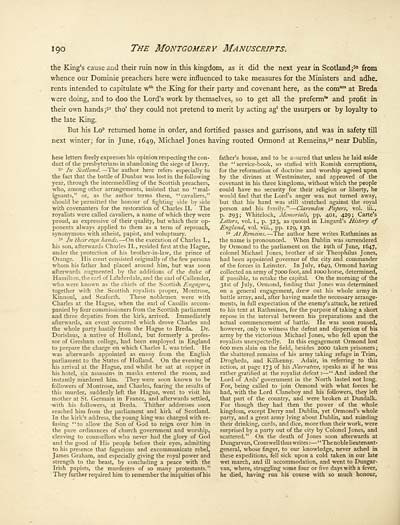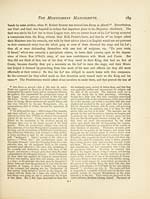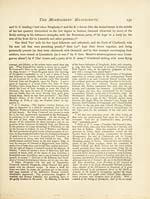Montgomery manuscripts
(204) Page 190
Download files
Complete book:
Individual page:
Thumbnail gallery: Grid view | List view

190
The Montgomery Manuscripts.
the King's cause and their ruin now in this kingdom, as it did the next year in Scotland; 50 from
whence our Dominie preachers here were influenced to take measures for the Ministers and adhe.
rents intended to capitulate w th the King for their party and covenant here, as the com™ at Breda
were doing, and to doo the Lord's work by themselves, so to get all the preferm" and profit in
their own hands; 51 tho' they could not pretend to merit by acting ag l the usurpers or by loyalty to
the late King.
But his Lo r ' returned home in order, and fortified passes and garrisons, and was in safety till
next winter; for in June, 1649, Michael Jones having routed Ormond at Remeins, 52 near Dublin,
hese letters freely expresses his opinion respecting the con-
duct of the presbyterians in abandoning the siege of Deny.
s° In Scotland. — The author here refers especially to
the fact that the battle of Dunbar was lost in the following
year, through the intermeddling of the Scottish preachers,
who, among other arrangements, insisted that no "mal-
ignants," or, as the author terms them, "cavaliers,"
should be permitted the honour of fighting side by side
with covenanters for the restoration of Charles II. The
royalists were called cavaliers, a name of which they were
proud, as expressive of their quality, but which their op-
ponents always applied to them as a term of reproach,
synonymous with atheist, papist, and voluptuary.
51 In their ovjn hands. — On the execution of Charles I.,
his son, afterwards Charles II., resided first at the Hague,
under the protection of his brother-in-law, the prince of
Orange. His court consisted originally of the few persons
whom his father had placed around him, but was soon
afterwards augmented by the additions of the duke of
Hamilton, the earl of Lauderdale, and the earl of Callender,
who were known as the chiefs of the Scottish Engagers,
together with the Scottish royalists proper, Montrose,
Kinnoul, and Seaforth. These noblemen were with
Charles at the Hague, when the earl of Cassilis accom-
panied by four commissioners from the Scottish parliament
and three deputies from the kirk, arrived. Immediately
afterwards, an event occurred which drove Charles and
the whole party hastily from the Hague to Breda. Dr.
Dorislaus, a native of Holland, but formerly a profes-
sor of Gresham college, had been employed in England
to prepare the charge on which Charles I. was tried. He
was afterwards appointed as envoy from the English
parliament to the States of Holland. On the evening of
his arrival at the Hague, and whilst he sat at supper in
his hotel, six assassins in masks entered the room, and
instantly murdered him. They were soon known to be
followers of Montrose, and Charles, fearing the results of
this murder, suddenly left the Hague, went to visit his
mother at St. Germain in France, and afterwards settled,
with his followers, at Breda. Thither addresses soon
reached him from the parliament and kirk of Scotland.
In the kirk's address, the young king was charged with re-
fusing "to allow the Son of God to reign over him in
the pure ordinances of church government and worship,
cleaving to counsellors who never had the glory of God
and the good of His people before their eyes, admitting
to his presence that fugacious and excommunicate rebel,
James Graham, and especially giving the royal power and
strength to the beast, by concluding a peace with the
Irish papists, the murderers of so many protestants. "
They further required him to remember the iniquities of his
father's house, and to be a-sured that unless he laid aside
the " service-book, so stuffed with Romish corruptions,
for the reformation of doctrine and worship agreed upon
by the divines at Westminster, and approved of the
covenant in his three kingdoms, without which the people
could have no security for their religion or liberty, he
would find that the Lord's anger was not turned away,
but that his hand was still stretched against the royal
person and his family." — Clarendon Papers, vol. iii. ,
p. 293; Whitelock, Memorials, pp. 401, 429; Carte's
Letters, vol. i., p. 323, as quoted in Lingard's History of
England, vol. viii. , pp. 129, 130.
52 At Remeins. — The author here writes Rathmines as
the name is pronounced. When Dublin was surrendered
by Ormond to the parliament on the 19th of June, 1647,
colonel Michael Jones, brother of sir Theophilus Jones,
had been appointed governor of the city and commander
of the forces in Leinster. In July, 1649, Ormond having
collected an army of 7000 foot, and 1000 horse, determined,
if possible, to retake the capital. On the morning of the
31st of July, Ormond, finding that Jones was determined
on a general engagement, drew out his whole army in
battle array, and, after having made the necessary arrange-
ments, in full expectation of the enemy's attack, he retired
to his tent at Rathmines, for the purpose of taking a short
repose in the interval between his preparations and the
actual commencement of battle. He was soon roused,
however, only to witness the defeat and dispersion of his
army by the victorious Michael Jones, who fell upon the
royalists unexpectedly. In this engagement Ormond lost
600 men slain on the field, besides 2000 taken prisoners;
the shattered remains of his army taking refuge in Trim,
Drogheda, and Kilkenny. Adair, in referring to this
action, at page 173 of his Narrative, speaks as if he was
rather gratified at the royalist defeat : — " And indeed the
Lord of Ards' government in the North lasted not long.
For, being called to join Ormond with what forces he
had, with the Lord Claneboy and his followers, they left
that part of the country, and were broken at Dundalk.
For though they had then the power of the whole
kingdom, except Derry and Dublin, yet Onnond's whole
party, and a great army lying about Dublin, and minding
their drinking, cards, and dice, more than their work, were
surprised by a party out of the city by Colonel Jones, and
scattered." On the death of Jones soon afterwards at
Dungarvan, Cromwell thus writes : — " The noble lieutenant-
general, whose finger, to our knowledge, never ached in
these expeditions, fell sick upon a cold taken in our late
wet march, and ill accommodation, and went to Dungar-
van, where, struggling some four or five days with a fever,
he died, having run his course with so much honour,
The Montgomery Manuscripts.
the King's cause and their ruin now in this kingdom, as it did the next year in Scotland; 50 from
whence our Dominie preachers here were influenced to take measures for the Ministers and adhe.
rents intended to capitulate w th the King for their party and covenant here, as the com™ at Breda
were doing, and to doo the Lord's work by themselves, so to get all the preferm" and profit in
their own hands; 51 tho' they could not pretend to merit by acting ag l the usurpers or by loyalty to
the late King.
But his Lo r ' returned home in order, and fortified passes and garrisons, and was in safety till
next winter; for in June, 1649, Michael Jones having routed Ormond at Remeins, 52 near Dublin,
hese letters freely expresses his opinion respecting the con-
duct of the presbyterians in abandoning the siege of Deny.
s° In Scotland. — The author here refers especially to
the fact that the battle of Dunbar was lost in the following
year, through the intermeddling of the Scottish preachers,
who, among other arrangements, insisted that no "mal-
ignants," or, as the author terms them, "cavaliers,"
should be permitted the honour of fighting side by side
with covenanters for the restoration of Charles II. The
royalists were called cavaliers, a name of which they were
proud, as expressive of their quality, but which their op-
ponents always applied to them as a term of reproach,
synonymous with atheist, papist, and voluptuary.
51 In their ovjn hands. — On the execution of Charles I.,
his son, afterwards Charles II., resided first at the Hague,
under the protection of his brother-in-law, the prince of
Orange. His court consisted originally of the few persons
whom his father had placed around him, but was soon
afterwards augmented by the additions of the duke of
Hamilton, the earl of Lauderdale, and the earl of Callender,
who were known as the chiefs of the Scottish Engagers,
together with the Scottish royalists proper, Montrose,
Kinnoul, and Seaforth. These noblemen were with
Charles at the Hague, when the earl of Cassilis accom-
panied by four commissioners from the Scottish parliament
and three deputies from the kirk, arrived. Immediately
afterwards, an event occurred which drove Charles and
the whole party hastily from the Hague to Breda. Dr.
Dorislaus, a native of Holland, but formerly a profes-
sor of Gresham college, had been employed in England
to prepare the charge on which Charles I. was tried. He
was afterwards appointed as envoy from the English
parliament to the States of Holland. On the evening of
his arrival at the Hague, and whilst he sat at supper in
his hotel, six assassins in masks entered the room, and
instantly murdered him. They were soon known to be
followers of Montrose, and Charles, fearing the results of
this murder, suddenly left the Hague, went to visit his
mother at St. Germain in France, and afterwards settled,
with his followers, at Breda. Thither addresses soon
reached him from the parliament and kirk of Scotland.
In the kirk's address, the young king was charged with re-
fusing "to allow the Son of God to reign over him in
the pure ordinances of church government and worship,
cleaving to counsellors who never had the glory of God
and the good of His people before their eyes, admitting
to his presence that fugacious and excommunicate rebel,
James Graham, and especially giving the royal power and
strength to the beast, by concluding a peace with the
Irish papists, the murderers of so many protestants. "
They further required him to remember the iniquities of his
father's house, and to be a-sured that unless he laid aside
the " service-book, so stuffed with Romish corruptions,
for the reformation of doctrine and worship agreed upon
by the divines at Westminster, and approved of the
covenant in his three kingdoms, without which the people
could have no security for their religion or liberty, he
would find that the Lord's anger was not turned away,
but that his hand was still stretched against the royal
person and his family." — Clarendon Papers, vol. iii. ,
p. 293; Whitelock, Memorials, pp. 401, 429; Carte's
Letters, vol. i., p. 323, as quoted in Lingard's History of
England, vol. viii. , pp. 129, 130.
52 At Remeins. — The author here writes Rathmines as
the name is pronounced. When Dublin was surrendered
by Ormond to the parliament on the 19th of June, 1647,
colonel Michael Jones, brother of sir Theophilus Jones,
had been appointed governor of the city and commander
of the forces in Leinster. In July, 1649, Ormond having
collected an army of 7000 foot, and 1000 horse, determined,
if possible, to retake the capital. On the morning of the
31st of July, Ormond, finding that Jones was determined
on a general engagement, drew out his whole army in
battle array, and, after having made the necessary arrange-
ments, in full expectation of the enemy's attack, he retired
to his tent at Rathmines, for the purpose of taking a short
repose in the interval between his preparations and the
actual commencement of battle. He was soon roused,
however, only to witness the defeat and dispersion of his
army by the victorious Michael Jones, who fell upon the
royalists unexpectedly. In this engagement Ormond lost
600 men slain on the field, besides 2000 taken prisoners;
the shattered remains of his army taking refuge in Trim,
Drogheda, and Kilkenny. Adair, in referring to this
action, at page 173 of his Narrative, speaks as if he was
rather gratified at the royalist defeat : — " And indeed the
Lord of Ards' government in the North lasted not long.
For, being called to join Ormond with what forces he
had, with the Lord Claneboy and his followers, they left
that part of the country, and were broken at Dundalk.
For though they had then the power of the whole
kingdom, except Derry and Dublin, yet Onnond's whole
party, and a great army lying about Dublin, and minding
their drinking, cards, and dice, more than their work, were
surprised by a party out of the city by Colonel Jones, and
scattered." On the death of Jones soon afterwards at
Dungarvan, Cromwell thus writes : — " The noble lieutenant-
general, whose finger, to our knowledge, never ached in
these expeditions, fell sick upon a cold taken in our late
wet march, and ill accommodation, and went to Dungar-
van, where, struggling some four or five days with a fever,
he died, having run his course with so much honour,
Set display mode to:
![]() Universal Viewer |
Universal Viewer | ![]() Mirador |
Large image | Transcription
Mirador |
Large image | Transcription
Images and transcriptions on this page, including medium image downloads, may be used under the Creative Commons Attribution 4.0 International Licence unless otherwise stated. ![]()
| Histories of Scottish families > Montgomery manuscripts > (204) Page 190 |
|---|
| Permanent URL | https://digital.nls.uk/95235375 |
|---|
| Description | A selection of almost 400 printed items relating to the history of Scottish families, mostly dating from the 19th and early 20th centuries. Includes memoirs, genealogies and clan histories, with a few produced by emigrant families. The earliest family history goes back to AD 916. |
|---|

